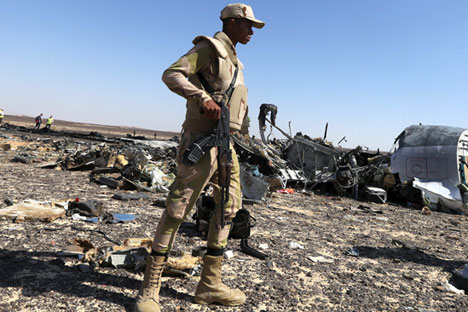
Wreckage of Russian Airbus A321 at the site of the crash in Sinai, Egypt.
ReutersThe Egyptian authorities have made a breakthrough in their fight against Islamists from the Ansar Beit al-Maqdis group fighting on the Sinai Peninsula, which has sworn allegiance to the Islamic State (ISIS) radical militant group.
On Nov. 9, Cairo reported it had killed one of the commanders of this grouping – Ashraf Ali Ali Hassanein al-Gharabli. According to Egyptian security officials, Gharabli was involved in organizing a string of terrorist attacks, including against civilians and foreign tourists.
The elimination of one of the country's most wanted terrorists has coincided with the investigation of the Russian aircraft crash over Sinai. In particular, British daily The Times, citing unnamed sources in the government, has not only confirmed that the plane was the target of a terrorist attack, but also identified its perpetrators.
According to the newspaper's source, the act was carried out by militants with the Ansar Beit al-Maqdis group, which has declared itself the Sinai branch of ISIS – Wilayat Sinai.
"There are a total of more than two dozen ISIS exclaves in the world now, and Wilayat Sinai is one of them," said Alexander Ignatenko, director of the Institute of Religion and Politics.
"Such enclaves tend to make their own decisions about the acts they commit, but do it with a statement in favor of the 'central organization'."
Ignatenko, however, is convinced that the conclusions of the direct participation of Wilayat Sinai in the preparation of a potential terrorist attack on board the Russian plane are premature.
"The situation with terrorists fighting in Sinai is not so clear; what happened could have been conceived not only by the members of this group, but by its agents – those who are directly or indirectly cooperating with the Wilayat," he said.
Among these "agents" Ignatenko named the key opponents of Egypt's incumbent president Abdel-Fattah al-Sisi – the Muslim Brotherhood, removed from power in a coup in 2013.
After the bloody crackdown of the Muslim Brothers' demonstrations on Rabia Square in Cairo, supporters of this movement were driven underground, where they continued fighting against Sisi's secular regime.
At the same time, Russia has established a close partnership with the Egyptian leader, and earlier this year, Moscow put the Muslim Brotherhood on the list of terrorist organizations banned in Russia – alongside ISIS.
Consequently, if the cause of the crash of the Russian airliner was indeed a terrorist act, the target of the organizers could have been not only Russia, but also the Egyptian leadership.
Ignatenko did not rule out that the "terrorist" theory of the crash in the sky over the Sinai may be related to the plans to involve Egypt – as a key Sunni state in the region – in international efforts to fight against ISIS.
"For the success of the Moscow-backed initiative of settlement in Syria, Egypt's participation is vital," he said.
Alexei Malashenko, an analyst from the Moscow Carnegie Center, admits that the tragedy in the sky over the Sinai has dealt a huge blow to Sisi's position, depriving the Egyptian economy of billions of dollars of tourism revenue.
However, he doubts that the attack was organized by Ansar Beit al-Maqdis militants or supporters of the Muslim Brotherhood.
"It would be logical to imagine that it was Islamists fighting in Syria who decided to harm Russia. They have every reason to seek revenge against Moscow," he said.
First published in Russian in Kommersant
All rights reserved by Rossiyskaya Gazeta.
Subscribe
to our newsletter!
Get the week's best stories straight to your inbox